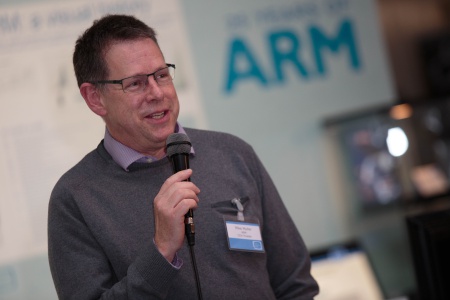25 years of ARM in 25 Objects

ARM, the jewel in the crown of the Cambridge tech industry, is the focus of our latest exhibition which opened to the public on November 28th. CCH Trustee and Chief Technology Officer of ARM, Mike Muller, officially opened the new exhibition at a private reception on the evening of November 27th, which happened to be the day ARM celebrated its silver anniversary! The exhibition - 25 years of ARM in 25 Objects - features the most significant collection of ARM memorabilia and artefacts ever to be shown in the UK. It will run until 20th December 2015. On 27th November 1990, Advanced RISC Machines (ARM) was spun out of Acorn and Apple Computer's collaboration efforts with a charter to create a new microprocessor standard. Jason Fitzpatrick, curator of the Centre for Computing History, said: “In this exhibition, we tell the dramatic story of how ARM’s 12 founding engineers, working out of an old barn in Swaffham Bulbeck deep in the heart of the Cambridgeshire countryside, turned their dream of mobile computing into a reality. “ARM’s technology is at the heart of our connected world today: most smartphones, tablets, cars and TVs plus millions of medical, wearable and other smart connected devices are powered by ARM technology. It’s estimated that over 60% of the world’s population touch an ARM-powered device every day! “25 years of ARM in 25 Objects is the story of Silicon Fen’s most successful start-up, and how its continuous journey of innovation has shaped our world.” The ARM @ 25 reception was attended by over 70 guests including CCH patron, Hermann Hauser. Guests were welcomed by CCH Trustee, Andy Harter of RealVNC, who introduced Mike Muller, CTO, ARM who was also one of the 12 founding engineers. Key exhibits include: Apple Newton MessagePad, 1993 - The Newton MessagePad became something of a joke – even making it on an episode of The Simpsons – because of its erratic handwriting recognition. The vision may have been bigger than the technology at that time, but it paved the way for later developments such as the iPad. One of the first generation personal digital assistants, the Newton was powered by the ARM610 chip. BBC Micro:bit - In the 1980s, the BBC Micro introduced many children to computing for the first time. The BBC Micro:bit - a pocket-sized computer powered by an ARM Cortex-MO – will build on that legacy for the digital age. This year, the BBC Micro:bit is being given away free to every UK child in Year 7, to inspire a new generation to get creative and start programming. Also on display are a champagne bottle cluster and a giant ARM microprocessor! -Ends- Note to Editors CCH delivers a range of education services for students and the general public. These practical learning sessions, for use on Raspberry Pi, the BBC Micro and the new BBC Micro:bit, include coding and electronics to help students expand their digital knowledge and creativity. About ARM About Steve Furber For further information or images, please contact:
Date : 04-12-2015 |









